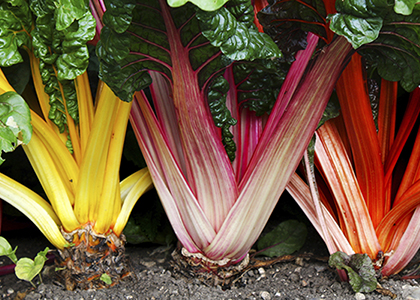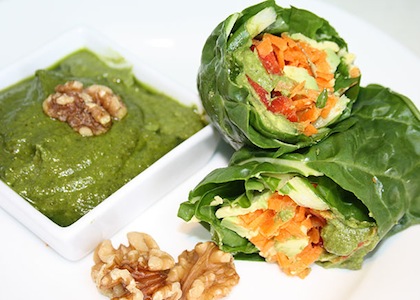
Why This Leafy Green Deserves the Spotlight
By Isabel Smith, MS, RD, CDN
Chard, or silverbeet as it can be referred to in Australia and the UK, is a magical green leafy vegetable that is often overlooked. Kale and spinach seem to get the spotlight most often, but chard is absolutely packed with healthful nutrients. This is good news for anyone who needs to monitor their intake of raw cruciferous vegetables due to hypothyroid or Hashimotos. Another great thing about chard is that it has a milder taste than kale, making it more subtle in your smoothies, and an excellent add to your saute pan.Chard comes in a few varieties including rainbow, green and ruby chard; regardless of the variety they hold high nutritional value.
The next time you reach for kale, think about switching it up by using this different leafy green that is PACKED with all of these wonderful nutrients:
Chard is loaded with nutrients including:
- Vitamin K: Helps with natural clotting processes in the body and is also important for bone health
- Vitamins A & C: Key for immune, skin and eye health
- Lutein & Zeaxanthin: Antioxidant compounds that have been found to help prevent macular degeneration
- Electrolytes: Sodium and potassium key for maintaining healthy blood pressure and hydration
- Magnesium: A mineral that also plays a key role in many different processes in the body and is key for healthy muscle contraction and relaxation, energy production, and bone health.
- Calcium: Calcium is key for bone health and is also important for muscle contraction.
- B Vitamins: Although on a lesser level than some of the other nutrients previously mentioned, chard is a source of energizing b-vitamins including b1, b2, b3, b5, and b6.
Chard is easy to consume. Here are a few easy recipes you can make with chard:
- Bread-free Wraps: Walnut Pesto Chard Wrap

- Juice it: Citrus Chard Juice
- Blend it: Pomegranate Blueberry Chard Smoothie
Or… swap in chard instead of using kale in these recipes:
- Bright Purple Kale (or Chard) Sunshine Citrus Juice Juice
- Pina-Kale (or Chard)-Ada Smoothie
- Kale (or Chard) Pesto White Bean Dip